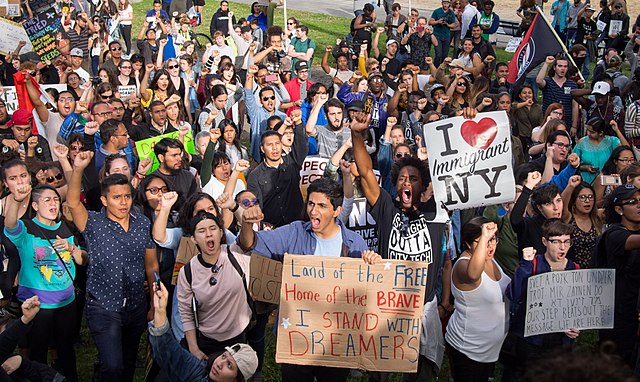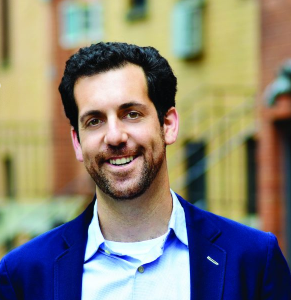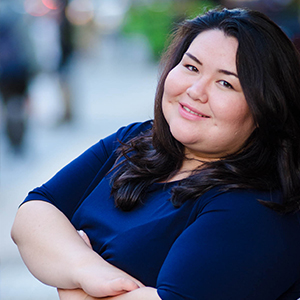“Young people can come together and radically change the face of politics, of policy, of culture,” Greisa Martinez tells Scott Warren. Martinez would know. As the executive director of United We Dream — the largest immigrant, youth-led network in the country — she’s helped to organize hundreds of thousands of young people across the country to fight for themselves, their families, and their communities. Martinez joined United We Dream after traveling to Washington, DC, to lobby Congress to pass the DREAM Act. The bill failed by five Democratic votes. “I fell into the embrace of the immigrant youth movement of United We Dream, of people who have felt the same disappointment, the same hope that I did but decided to not give up,” she remembers. “This was the first time I saw queer people say that they were unashamed of being trans and queer. And that moment of feeling like I could have a place where I could be both exactly who I was and impactful on the life of millions — that is the thing that got me hooked.” Martinez talks with Warren about the importance of personal transformation in the work, the long arc of the movement for justice, and how UWD’s strategies are shifting with the new administration. The interview has been edited and condensed.
How did you get involved in the work?
I got into this work because I was really ashamed of being undocumented. I was mad about what being undocumented meant for my family, like being really scared every time a police car drove behind us after church. It meant that some of us got healthcare and some of us didn’t. Ultimately, it meant that my mother, who lived undocumented in this country for more than 28 years, died undocumented because of lack of healthcare. I do this work in remembrance of her and also in remembrance of little Greisa, who was really ashamed of being queer, of being undocumented and not being allowed a place to be.
Why do you think that young people are at the forefront of change?
I think that you’re asking about our secret sauce. We believe that the core of the work we’re doing is about personal transformation. So if someone is able to come into a place that is able to receive them in the fullness of who they are, those people are able to go from shame and anonymity to pride and publicly owning their power. If you’re able to make that personal transformation, then you’re connected to a community that is able to act together, to move together, whether it’s at a local level, national level, state level. Once you’re able to make those connections with the community and have the investments of political education of the moment that you’re in, the urgency of the challenge that you’re facing — all of those things combined can lead to mass movement and mass radical change.
This has been the case for generations. I have teachers, Norma Wong and Helen Kim, who talk about this idea of the long arc, that I am not the beginning of anything or the end of anything. I am part of a continuation of generations of people, seven generations before me and seven generations after me. And my responsibility as a movement leader is to ensure that there is the infrastructure, that we do our work to deliver victories that make life better for the people to come after me.
Thinking about the “long arc,” can you talk about the lessons that you learned when you fell five votes short of passing the DREAM Act and how some of those lessons relate to your current strategies?
The first thing is that we understood the power of public narrative to shift political strategy. The second thing I learned is the role that racial capitalism plays in immigrant policy and narrative; sometimes even the solutions continue to uphold white supremacy and allow for people to make money off of Black and brown bodies. And the fact that we haven’t had a solution or a breakthrough in the last 35 years has not been because of lack of trying. It’s not been because of lack of political alignment across the parties. We now enjoy a majority of support from Republicans, Trump supporters, and Democrats and Independents. So it’s not public opinion. It’s not a lack of institutional power. And it’s not because we’re not cute or have cool t-shirts, because we have all of that. It is because there are broader forces that want to have Black and brown working-class people continue to be where they are. It’s going to be really important for us to be able to correctly place the immigrant justice movement within the racial justice movement because all of these things are interconnected.
The third thing is that it matters how you wage the fight. It matters how you win, it matters how you lose. One of the big lessons we learned at United We Dream is that we value our independence, that we do not owe ourselves to the Democrats, we do not owe ourselves to the Republicans. We owe ourselves to our communities. And we build independent political power that is able to deliver policy changes that have real impact on people’s everyday lives because that’s the signature of a good organizer.
What would you say to people who are skeptical about the ability of young people to bring about change?
I think that they’re not paying attention. In the last and most consequential election in U.S. history, it was young people — our outreach, the energy that we brought into the work — who increased Biden’s [numbers]. So if you don’t believe that young people can build sustainable political power, just look at the work that we’ve done in the last election. The work that the Sunrise Movement has done to dethrone incumbent Democrats who are not for the Green New Deal. You should point them to the Justice Democrats in New York. They have built a political infrastructure that is able to hold [politicians] accountable. [We need] a leadership development pipeline in which young people are positioned not as door knockers or as chant leaders or as mascots but as real strategists, as people who have real wins underneath their belts.
This issue is part of a two-part series, one focused on U.S.-based activism and the other focused on international youth organizing. Are you collaborating with youth activists outside the U.S.?
United We Dream stands at the intersection of the international and domestic by virtue of our immigrant experience. Sometimes it comes easier for us to be in conversations with people across the globe because migration is a global issue. We just finished a series of trainings with undocumented young people in Ireland and in Spain, where we’re sharing our best practices and helping incubate youth-led social movements in those places that are immigrant centered and immigrant powered.
Finally, so many of us have been deported — so many young people, veterans of our movement. So we find ourselves ensuring that those people are connected to social movements in their countries of origin. And now you have international movements that not only have the benefit of someone that is from that land, but then it’s also informed by their U.S. experience. That unique intersection is one that I’m really excited to explore with the members of United We Dream.
In preparation for the election in November 2020, we were in conversations with people from Brazil [and] Bolivia who had just come out of their own campaigns to overthrow white supremacists in their governments. And there was a lot of solidarity just being able to hear from people who had gone through that.
What lessons have you gleaned from folks in Bolivia and Brazil, and what does that solidarity really mean in a global context?
One of the lessons we gleaned from those conversations is that it’s important to have a long-term vision and public agenda that you’re building political support around. It is not enough to be against a candidate or a white nationalist because the reality is that those are just manifestations of a broader systemic challenge.
The second thing that we gleaned is that mass political violence is actually normal for a lot of them. And I think that it helped me at least be able to mentally prepare for what was to come on January 6th, when we saw the insurrection here. What would it look like for us to ensure that our people were safe and that we had a proper response to not goad folks into more political violence?
The third thing I’ll say is that I’m an organizer. And organizing is about relationships. It’s about being able to see each other eye to eye, just like you and I are doing right now. And to be able to see and feel global solidarity in a moment of personal, deep concern about what was going to happen to United We Dream, what was going to happen to me as an undocumented woman here in the U.S., depending on the results of the election. That feeling that no matter what, we’re going to be okay because we are in community and we’re organizing.
If you’re wildly successful in gaining power, what does the country or the world look like in ten years, and what is the role of young people in getting us there?
We actually had this conversation with the members of UWD. We did a hundred-year visioning. The future that young people will deliver will be a future where Black folks are able to breathe. And they’re able to walk the streets without any hesitation or fear. Where people like myself are able to freely move across borders and across lines. Where ease and health are a normal thing for everyone. Working families will have all they really deserve and really need. We will see joy, we will see a lot of dancing. The future young people will deliver will ensure that a democracy is real and reflective of its people. And it will include the ability for you and I to be out of jobs and to ensure that we’re drinking drinks with umbrellas on them. Because other people are going to be out behind us and taking on our roles. And that makes me really proud. If we’re able to help build a generation of young people — and make their work more sustainable, make their work clear — while we also deliver on immigrant justice and racial justice, I would have spent my life in a really good way.


